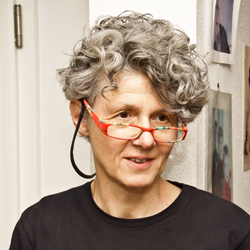
Your complimentary articles
You’ve read one of your four complimentary articles for this month.
You can read four articles free per month. To have complete access to the thousands of philosophy articles on this site, please
News
News: April/May 2024
Philosophy faces closure at Univ. of Kent • Museum of Philosophy displays fake news • Test case for ‘protected beliefs’ — News reports by Anja Steinbauer
Schock Announcement

Irene Heim
Photo: Philipp Heim-Antolin
The Rolf Schock Prizes for achievements in mathematics, philosophy, art and music have been awarded at irregular intervals of between one and three years since 1993 by the Swedish Royal Academies. The prizes, which include a cash award of 600,000 Swedish krona (around £60,000), are named after the Swedish philosopher and logician Rolf Schock who died in 1986. This year’s philosophy prize was jointly awarded to Hans Kamp, of the University of Stuttgart, and Irene Heim, from MIT, “for the (mutually independent) conception and early development of dynamic semantics for natural language.” The press release of the Academy explains: “Natural languages are highly context-dependent – how a sentence is interpreted often depends on the situation, but also on what has been uttered before… Around 1980, Hans Kamp and Irene Heim each separately developed very similar solutions to this problem. Their theories brought far-reaching changes in the field. Both introduced a new level of representation between the linguistic expression and its worldly interpretation and, in both, this level has a new type of linguistic meaning. Instead of the traditional idea that a clause describes a worldly condition, meaning at this level consists in the way it contributes to updating information. Based on these fundamentally new ideas, the theories provide adequate interpretations of the problematic constructions.” Congratulations to both laureates from Philosophy Now.

Royal Swedish Academy of Sciences, Stockholm
© Hackspett 2006. Creative Commons 2.5
University Applies Occam’s Razor
In sadder news, the University of Kent at Canterbury is planning to close its Philosophy section along with a number of other humanities subjects. Philosophy at Kent enjoys an excellent reputation, having recently been ranked third for overall student satisfaction and fifth in the UK for research quality according to THES. KentOnline said: “The university is facing a series of major problems at the same time including a drop in foreign students applying since Brexit and its ranking fell by 26 places over the last eight years, according to the Complete University Guide. Added to this, bosses have battled to manage finances – constructing buildings in Medway they’re now moving out of – while income from capped tuition fees has fallen due to inflationary pressures and dwindling applications.” Jon Williamson, Professor of Philosophy at Kent, commented on X: “We perform well on all measures, including student recruitment. But smaller subjects have less clout and are easiest to cut.” He added: “This is a turning point in UK higher education. A financially viable department cut in order to pay for the expansion of subjects that get more high-fees international students. If this is allowed to happen, many many unis will follow. Please speak out!” A spokesperson for the university told Philosophy Now: “In making these changes we have had to look across our entire portfolio, recognising that in trying to maintain a very broad offer we have at times spread ourselves too thinly. Courses being phased out are projected to have smaller pools applying to non-Russell Group universities in future which limits the opportunity for Kent to recruit cohorts large enough to sustain them longer term. The financial pressures facing the sector mean we have to focus resources on areas where we know more students are looking for university places and which are already growing at Kent.” How closing such a central subject as philosophy will enhance the university’s credibility was not explained.
There is a change.org petition you can sign to support the threatened subjects: tinyurl.com/KentHumanitiesPetition.
Philosophy Museum Exhibition on Conspiracies & Fake News
The world’s first museum of philosophy was launched in Milan in 2018. In February 2024 it held an exhibition called ‘A Journey on the Philosophy of Disinformation’. (Or did it?) It contained videos, cartoons, art, games and boards designed to stimulate thought and discussion on the distinctions between news and fake news. Professor Lisa Bortolotti and colleagues from the University of Birmingham worked with Dr Anna Ichino of the Philosophy Department at the University of Milan to design exhibits to explore how conspiracy theories emerge, take hold, and become prominent, so that they often seem more attractive than other explanations. Also included was an amusing ‘Conspiracy Kitchen’ cooked up at Nottingham and the University of Kent, showing the structure of a conspiracy theory and helping you to create brand new ones of your own. For more about this (in Italian) see ‘Nuove Sale’ at museodellafilosofia.unimi.it.
Protected Beliefs
Under the UK’s Equality Act 2010, certain religious and philosophical beliefs are ‘protected characteristics’, and it is unlawful to discriminate against somebody for holding them. Dr Ali is a philosopher who lectures in ethics at the London School of Philosophy; he is also a political activist, and former Deputy Leader of the Green Party of England and Wales. In February 2024, Dr Ali won a landmark legal case against his own political party. He had argued that he had been subject to sustained discrimination within his party because of hostility to his ‘gender critical’ beliefs. A previous court case (the Forstater judgment of 2021) had established that gender critical views are ‘protected beliefs’. Now in the first ‘protected belief’ case against a political party, Judge Hellman ruled that the party had subjected Dr Ali to unlawful discrimination in failing to follow a fair procedure when dismissing him from his post as national spokesperson for policing and justice. Dr Ali was awarded damages in addition. The judge however affirmed that a party is not obliged to keep a spokesperson who disagrees with party policy.
Reflecting on his victory, Dr Ali said: “I wanted to be able to lay down a legal marker that not only are common or garden beliefs, such as the immutability of sex, worthy of respect in a democratic society but worthy of respect in a political party, too.”









